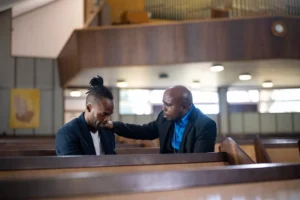Abigail and I were one hour into the Nativity party we were hosting for Christian graduate students. Guests were still arriving, but we’d reached the point that Scott, our physicist, calls “self-sustaining festive reaction.”
Laura Prime approached. That’s not really her name; we call her that because she was the first of the four Lauras in the group. Besides, she’s a mathematician. “Merry Christmas!” said Abby.
“Blessed Advent!” returned Laura Prime. “It’s not Christmas yet!”
Arlen, our English scholar, said “Actually, ‘Merry Christmas’ doesn’t mean that Christmas is merry — it expresses a wish that your Christmas be merry. So Mrs. Theo’s greeting was perfectly correct.” Abby smiled. Laura laughed. Judah, computer science, looked at Laura quizzically.
“Why is that funny?” he asked.
“I don’t know,” she said, “it just is.”
I remarked, “I have a theory that people in different fields of study develop different senses of humor.”
“If you’d said that people who speak different languages develop different senses of humor, I might have believed it,” said Carolyn, who studies the Germanic tongues.
“No, he’s right,” said Scott. “For instance, physicists like limericks:
There was a young lady from Bright
Whose speed was much faster than light.
She set out one day,
In a relative way,
And came back on the previous night.”
“I don’t know about limericks,” said Liz, philosopher, “but philosophers like puns. Speaking of which, did you know that James Fenimore Cooper wrote a biography of Santa Claus?”
Ben, our classicist, perked up his ears. “I’ll be sorry I asked — but what’s it called?”
“The Deer Sleigher.”
Everyone groaned but Judah, who said “Now that’s funny. I’ve got one. If X, then Y. But Y?”
Fortunately, at that moment the doorbell rang. Amy entered. As soon as she saw the creche — the Nativity scene — she headed for it like a moth for the light. “How beautiful!” she said. “Like an icon.”
“Technically,” said Max (philosophy, husband of Liz), “it is an icon. You see through it to what it represents.”
“I may be wrong — most of my culture is in a Petrie dish — but couldn’t you say that of any realistic image?” That was Sky, molecular biology.
“Not the same thing,” said Nastasia, art history. “In what you’re calling realism, what you see represents how things might have actually looked. In an icon, it symbolizes the spiritual reality. Whether things looked exactly like that isn’t important.”
“I’m looking at the carving right now,” said Scott. “The baby looks like a baby, the mother like a mother, the father like a father —”
“No, she’s right,” said Xandra, child development. “See how the baby is holding his hands? Newborns don’t do that. It’s a gesture of blessing.”
“Right,” said Max. “The point isn’t that the infant Jesus held his hands just so, but that through Him, all blessing comes.”
“Why does Mary sit so stiffly?” asked Scott.
Someone laughed; turning my head, I saw that it was Paul, dramatic arts. “If you’d just had a baby, you’d sit stiffly too.” More and more of the guests were gathering around the creche.
“She’s not sitting stiffly, she’s sitting royally,” Ben protested. “Like a queen.”
“Like the mother of the King,” added Arlen.
Scott demurred, “Is it a good idea to make such a big deal over Mary?”
“The angel did,” said Amy “‘Hail, Favored One.'”
“But all she did was say ‘Yes.'”
“Is it such a little thing to say ‘Yes’ to God?” she answered. “She’s engaged, but she’s a virgin, okay? One day, in comes an angel, salutes her like royalty, and says ‘By the way, you know that Messiah the prophets have been promising for centuries? Well, you’re going to have a baby.'”
“But it was a privilege,” said Ben.
“Do you think many engaged virgins would be okay with that sort of privilege?”
“You see her as a sort of disciple, don’t you?”
“I see her as the first disciple. ‘Be it unto me as you have said.’ She showed us how to say it.”
“What about Joseph?” asked Jesse, our psychologist.
“We do tend to overlook him, don’t we?” said Kendra. She’s in linguistics with Amy.
“The Bible sure doesn’t,” Jesse answered. “In the Gospels, he comes across like a biblical patriarch.”
“Not like,” said Arlen.
“What do you mean?” asked Laura — I mean Laura II, the one in broadcasting.
“I mean that if Mary is the First of the Disciples, then Joseph is the Last of the Patriarchs. Can’t you see it? He’s of royal lineage. He inherits God’s promises to David. And he’s in direct line of descent from his namesake, the Old Testament Joseph.”
“Now that you mention it,” said Kendra, “There are a lot of parallels between the two Josephs.”
“Both were sent into Egypt,” said Scott.
“Both received messages from God in dreams,” added Liz.
“Both had fathers named Jacob,” said Carolyn. “Both had ancestors named Rachel.”
“Is that kind of detail important?” asked Laura II.
Jesse said, “The Gospel writers seemed to think so. It’s as though all of Israel was summed up in Mary and Joseph. When God got ready for Christmas, He did it right.”
I can always count on Zack to throw a bomb into any proceedings, and he did. “Actually,” he said, “the whole Christmas thing makes me feel kind of weird sometimes.”
All eyes turned to him. “Are you talking about how it’s been commercialized?” asked Max.
“No, that’s annoying, but I can ignore it.”
“Were you brought up in one of those religions that say Christmas is really pagan?” asked Carolyn.
“No,” he said, “nothing like that.”
“Are you having doubts about Jesus being God made Man?” asked Paul.
“No, I believe in the Incarnation. And I’m pro-Jesus, you know?”
“Then what?” asked Laura Prime.
“It’s just that — well — I like Jesus all right — but why do we make such a big deal of the baby Jesus? It’s what He did as a man that makes all the difference to us, isn’t it? I don’t get why Matthew and Luke talk about his babyhood at all.”
“Maybe I’m missing something,” said Liz, “but didn’t Jesus have to be a baby in order to grow into a man?”
“Sure,” said Zack. “But that just goes to show what I’m trying to say. He did all the important things at the end of His life, not at the beginning. Easter — that’s important. That marks our salvation. But what’s so important about Jesus’ infancy?”
Zack looked around the group. “Nobody’s saying anything. Is it a secret or something? ‘Don’t tell Zack’?” That made everyone laugh and broke the tension.
Max said, “You said you believed in the Incarnation. But if the Gospels had passed over Jesus’ infancy, wouldn’t that doctrine seem kind of abstract, or even make-believe? It would be hard to believe that Jesus really became a man of flesh and blood, if He hadn’t begun the way we all did, helpless and dependent on our parents.”
“Yea-h-h, maybe” said Zack.
Paul chimed in. “Doesn’t it show how far He was willing to go for our salvation? I mean, think about it. God — the Eternal, the Uncreated, the All-Powerful — He humbles Himself. He stoops to become a human baby. At the other end of His time on earth He stoops to be crucified on the Cross. It all goes together.”
“I never thought of that,” said Zack. “And if even God humbles Himself — ” He let the sentence trail off, then began again. “I’m thinking of where He says that to enter the kingdom of God, you have to receive it like a child. Maybe I am missing something.”
There was silence for a few seconds. Amy glanced around. “If nobody else wants to say anything — I think another part of it is that God wanted to show us the Holy Family. God Himself is a family, in a way — Father, Son and Holy Spirit, united in love. Our families ought to be images of that.”
“I see what you mean,” said Zack. “Because we’re made in His image.”
Amy said, “Right, but we fall short —”
He finished the sentence for her. ” — so we needed it modeled for us,” She nodded.
Ruthie stirred. She’s our only new Mom — married to Matthew, antediluvian studies.
“All of this is important,” she said, “but aren’t we missing something?” Faces turned in her direction. She glanced down at the child in her lap.
“We haven’t really talked about how it is with babies. When a baby is born, you don’t say much to him, and he doesn’t say much to you — anyway, not in words you understand.” She stroked his soft hair. “But you spend a lot of time just looking at each other. And that’s how you learn to love him.”
When no one said anything, she looked up. “I’m not making myself clear, am I? Matthew, he’s getting fussy — would you explain?”
Matthew asked, “Are you thinking of the story we were talking about this afternoon?” She nodded. Smiling at her and the baby, he began. “A 19th-century French Christian, the Cure of Ars, told about a peasant who used to come every day to the church and spend a long time in silence. The Cure couldn’t figure out what he was doing, so finally, one day, he asked him. Referring to Jesus, the peasant answered simply, ‘I look at Him, and He looks at me.'”
He cleared his throat self-consciously. “Well, he said, “like Ruthie was saying, that’s how it is with babies too. And I think that’s one of the reasons it’s important to contemplate Jesus’ babyhood.”
Leaving the group, I crept into the kitchen to help Abby, who was getting more punch for the bowl. She smiled at me.
“You aren’t saying much tonight,” she said.
“I don’t need to,” I replied.
With gratitude to A.L., from whom I have shamelessly lifted an idea, proving that I was listening after all.
Copyright 2004 J. Budziszewski. All rights reserved.









